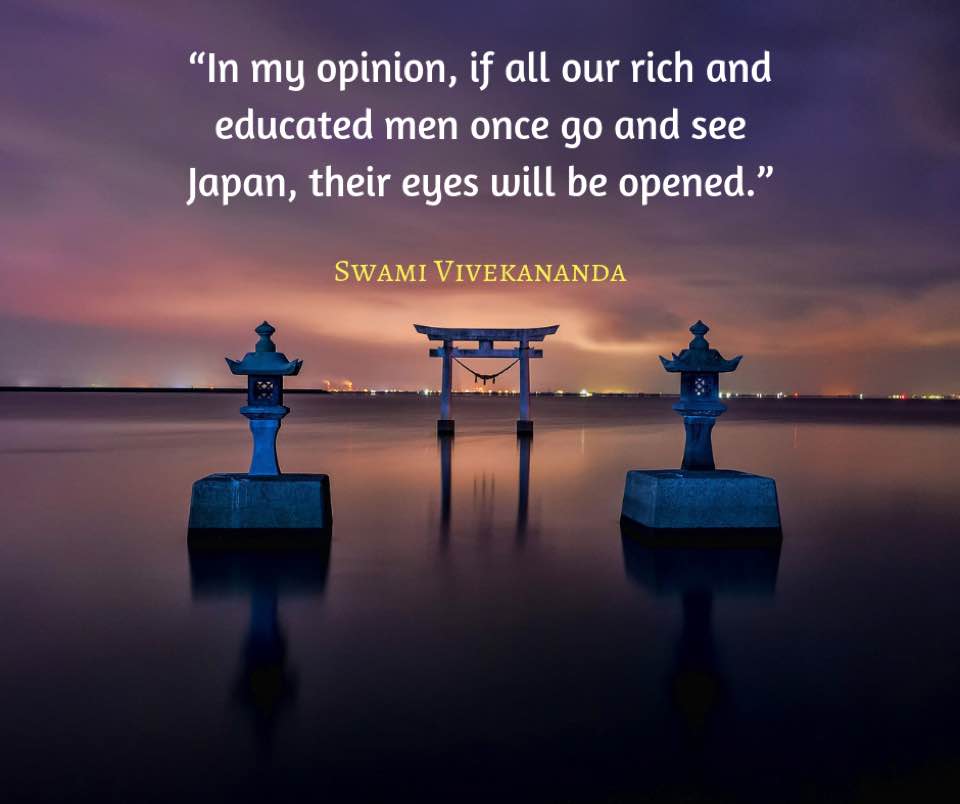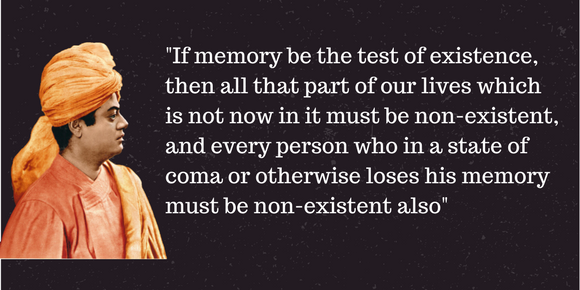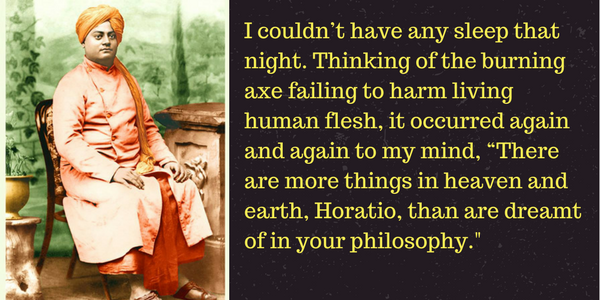Swami Vivekananda, a keen observer of nations and people admired the Japanese greatly. His appreciation of the Japanese was so great that he wanted all the Young men of India to visit Japan once every year.
Swamiji was particularly appreciative of the Patriotism and the Art of the Japanese. In response to a question, he said,
“The world has never seen such a patriotic and artistic race as the Japanese, and one special feature about them is this that while in Europe and elsewhere Art generally goes with dirt, Japanese Art is Art plus absolute cleanliness. I would wish that every one of our young men could visit Japan once at least in his lifetime.
The reasons for the greatness of Japan according to Swamiji was,
“The faith of the Japanese in themselves, and their love for their country. When you have men who are ready to sacrifice their everything for their country, sincere to the backbone — when such men arise, India will become great in every respect. It is the men that make the country! What is there in the country? If you catch the social morality and the political morality of the Japanese, you will be as great as they are. The Japanese are ready to sacrifice everything for their country, and they have become a great people. But you are not; you cannot be, you sacrifice everything only for your own families and possessions.
To a question whether India should become like Japan,
“Decidedly not. India should continue to be what she is. How could India ever become like Japan, or any nation for the matter of that? In each nation, as in music, there is a main note, a central theme, upon which all others turn. Each nation has a theme: everything else is secondary. India’s theme is religion. Social reform and everything else are secondary. Therefore India cannot be like Japan. It is said that when ‘the heart breaks’, then the flow of thought comes. India’s heart must break, and the flow of spirituality will come out. India is India. We are not like the Japanese, we are Hindus. India’s very atmosphere is soothing. I have been working incessantly here, and amidst this work I am getting rest. It is only from spiritual work that we can get rest in India. If your work is material here, you die of — diabetes!
In a letter written to Alasinga Perumal in 1893, he wrote,
“The Japanese are one of the cleanliest peoples on earth. Everything is neat and tidy. Their streets are nearly all broad, straight, and regularly paved. Their little houses are cage-like, and their pine-covered evergreen little hills form the background of almost every town and village. The short-statured, fair-skinned, quaintly-dressed Japs, their movements, attitudes, gestures, everything is picturesque. Japan is the land of the picturesque! Almost every house has a garden at the back, very nicely laid out according to Japanese fashion with small shrubs, grass-plots, small artificial waters, and small stone bridges.
In the same letter, he further wrote about the self-reliance of the Japanese,
“The Japanese seem now to have fully awakened themselves to the necessity of the present times. They have now a thoroughly organised army equipped with guns which one of their own officers has invented and which is said to be second to none. Then, they are continually increasing their navy. I have seen a tunnel nearly a mile long, bored by a Japanese engineer.
“The match factories are simply a sight to see, and they are bent upon making everything they want in their own country. There is a Japanese line of steamers plying between China and Japan, which shortly intends running between Bombay and Yokohama.
Swamiji seems to have been greatly disturbed by the conditionn of our country when he compared it with the Japanese. Very stirringly he wrote,
I cannot write what I have in my mind about the Japs in one short letter. Only I want that numbers of our young men should pay a visit to Japan and China every year. Especially to the Japanese, India is still the dreamland of everything high and good. And you, what are you? . . . talking twaddle all your lives, vain talkers, what are you? Come, see these people, and then go and hide your faces in shame. A race of dotards, you lose your caste if you come out! Sitting down these hundreds of years with an ever-increasing load of crystallised superstition on your heads, for hundreds of years spending all your energy upon discussing the touchableness or untouchableness of this food or that, with all humanity crushed out of you by the continuous social tyranny of ages — what are you? And what are you doing now? . . . promenading the sea-shores with books in your hands — repeating undigested stray bits of European brainwork, and the whole soul bent upon getting a thirty-rupee clerkship, or at best becoming a lawyer — the height of young India’s ambition — and every student with a whole brood of hungry children cackling at his heels and asking for bread! Is there not water enough in the sea to drown you, books, gowns, university diplomas, and all?
Come, be men! Kick out the priests who are always against progress, because they would never mend, their hearts would never become big. They are the offspring of centuries of superstition and tyranny. Root out priest craft first. Come, be men! Come out of your narrow holes and have a look abroad. See how nations are on the march! Do you love man? Do you love your country? Then come, let us struggle for higher and better things; look not back, no, not even if you see the dearest and nearest cry. Look not back, but forward!
In an interview he expressed his desire to send Indian students to Japan to learn Technology. He said,
“If I can get some unmarried graduates, I may try to send them over to Japan and make arrangements for their technical education there, so that when they come back, they may turn their knowledge to the best account for India. What a good thing that would be!
He was in particular greatly appreciative of the way in which Japan assimilated the good things of the West without giving up its own native culture. He wanted the Indian educated men to do something similar. He said,
In my opinion, if all our rich and educated men once go and see Japan, their eyes will be opened. There, in Japan, you find a fine assimilation of knowledge, and not its indigestion, as we have here. They have taken everything from the Europeans, but they remain Japanese all the same, and have not turned European; while in our country, the terrible mania of becoming Westernised has seized upon us like a plague.
He had some interesting observations about the Japanese food too,
“To fill the stomach with a large quantity of rice is the root of laziness. Look at the Japanese, they take rice with the soup of split peas, twice or thrice a day. But even the strongly built take a little at a time, though the number of meals may be more. Those who are well-to-do among them take meat daily. While we stuff ourselves twice a day up to the throat, as it were, and the whole of our energy is exhausted in digesting such a quantity of rice!
Continuing the discussion Swamiji adviced people to take about half a pound of meat daily and that in case they don’t have money they should work hard giving up laziness and spending time idly.
Referring to the patriotism of the Japanese, he told Sister Nivedita,
No nation, not Greek or another, has ever carried patriotism so far as the Japanese. They don’t talk, they act — give up all for country. There are noblemen now living in Japan as peasants, having given up their princedoms without a word to create the unity of the empire. And not one traitor could be found in the Japanese war. Think of that!




Leave A Comment